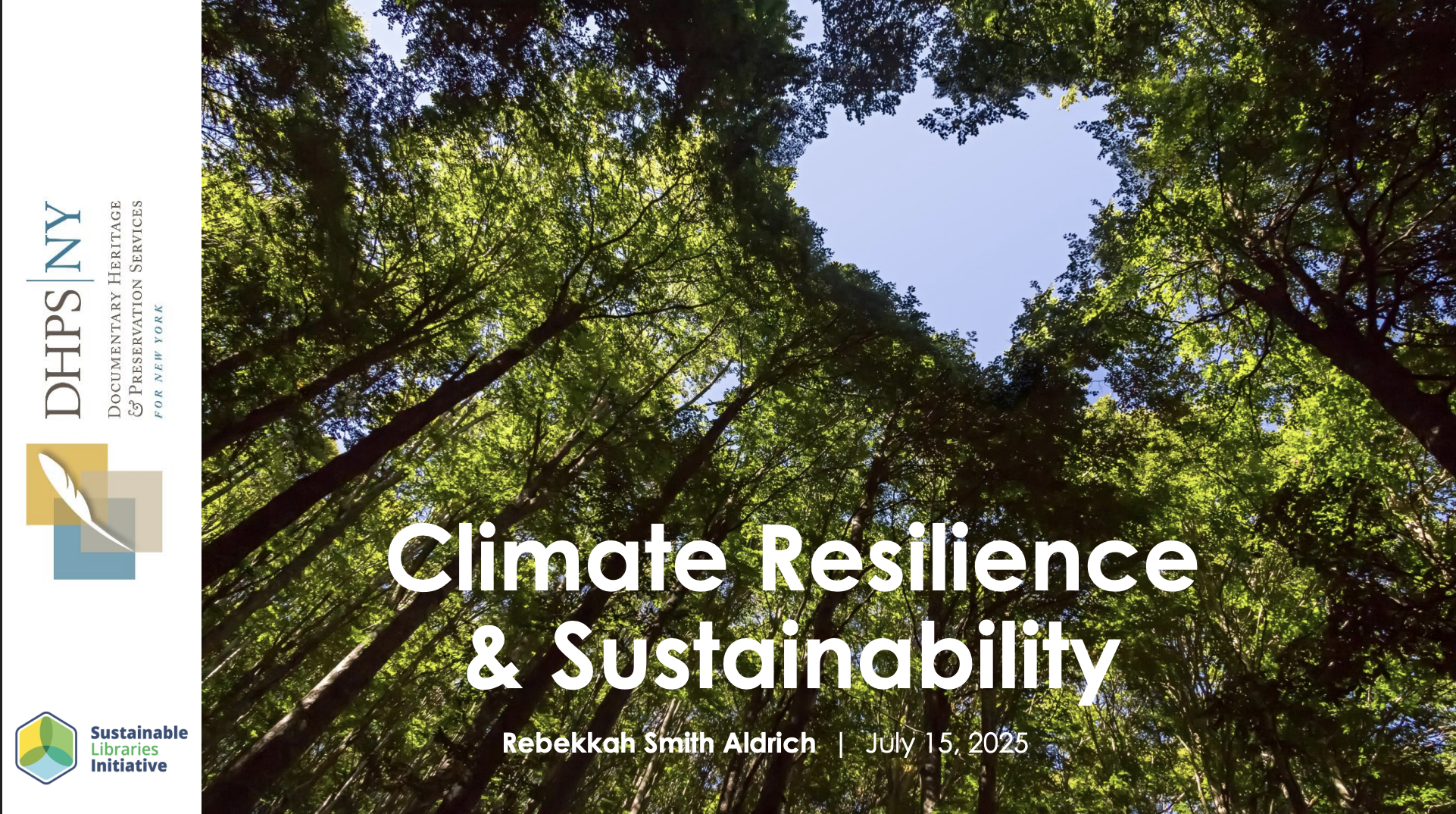
Each year, DHPSNY Dialogues bring cultural heritage professionals together to engage in meaningful discussions about the challenges and opportunities shaping our field. In 2025, our series focuses on Collections for the Future of New York, asking: What can we, as practitioners—both paid and volunteer—do to build and steward collections for the communities of tomorrow?
At our July 15 program, Climate Resilience & Sustainability: Collections Care for the Future, co-facilitated by Aria Camaione-Lind of Aria Strategies and Rebekkah Smith Aldrich of the Mid-Hudson Library System and Sustainable Libraries Initiative, our webinar and follow-up conversations focused on climate change impacts in New York State, the importance of emergency preparedness, and an in-depth look at the Sustainable Libraries Initiative presented by Rebekkah.
We spent the first part of the program hearing from Aria and Rebekkah, followed by a conversation with Rebekkah and program attendees. Aria shared the co-facilitators’ assumptions for the session: climate change and human migration are here to stay; the work of “saving stuff” affects the climate, yet aligns with how our audiences prefer to learn; and regardless of organization type or background, we are committed to the core beliefs of librarianship. Aria touched on emergency preparedness (resources are linked below!) and the importance of making these climate resilience connections in your organization, whether it is a library or not. After Rebekkah’s in-depth look at the Sustainable Libraries Initiative, she and program attendees discussed strategies for engaging people in this work, supporting future practitioners, and accelerating progress.
Here, co-facilitator Rebekkah Smith Aldrich, shares some takeaways:
Sustainability is the newest core value of librarianship, joining Access, Equity, Intellectual Freedom and Privacy, and The Public Good as the foundation upon which libraries across the country design collections, services, partnerships, and programs. Sustainability in this context is defined using the “triple bottom line” approach, meaning that the goal is to find balance among economic feasibility, social equity, and environmental stewardship. When these three dimensions are brought into closer alignment, we are living our values out loud.
This perspective offers a lens through which to make better decisions tomorrow than we did yesterday. The decisions we make every day—about things large and small—can benefit from this thinking, from office supplies to facilities.
To be true to this core value of sustainability, libraries—and other cultural institutions—need to engage in climate adaptation planning, considering how to adjust and prepare for predicted impacts of climate change in their regions.
This can include practical decisions and plans in areas such as collection preservation in the face of potential flooding, use of facilities as havens during extreme heat, cold, or poor air quality, and social cohesion work, which will become increasingly important as people from other parts of the country and world seek refuge from areas more severely affected by climate change.
Libraries are key to the social infrastructure needed today and in the future to manage the disruptions caused by climate change.
Access the recorded portion of the session.
View or download the slideshow.
Resources for Further Study
- American Institute for Conservation – Sustainability Resources
- American Library Association Institutional Repository – Panel: Environmentally Sustainable Preservation of Physical and Digital Materials
- Emergency Management Cycle – CCAHA
- Emergency Management for Cultural Heritage Institutions – CCAHA
- Emergency Planning and Preparedness: A Guide to Basics – Slides | Webinar
- Emergency Planning Roundtable – YouTube
- Emergency Planning: Working with First Responders – YouTube
- Emergency Preparedness Basics: Getting Started – YouTube
- Emergency Supplies on a Shoestring – DHPS Tips Blog
- Emergency Supply Kits – CCAHA
- National Climate Action Strategy for Libraries – Sustainable Libraries Initiative
- National Resource Guide for Disaster Preparedness – CCAHA
- Northeast Summit on Climate Adaptation – LibGuide Resources
- Not-so-impossible Choices: Determining Priorities for Collections Salvage – YouTube
- NYLA Sustainable Libraries Initiative
- SAA Climate Change Resources for Archivists
- Sustainability Tools in Cultural Heritage – STICH
- Weather Network, Smithtown Library 2024 Flood Video – Facebook
If you attended this event, we'd love to hear your feedback to help improve future programming by completing this survey.